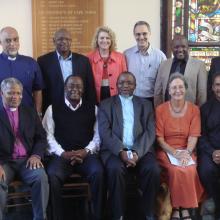african national congress
In the fall of 1981 I was a freshman at the University of California, Davis. It didn’t take long for me to step into the “Free South Africa” divestment movement sweeping the U.C. system.
I already had some traction with political protest. My first “demonstration” that I can remember was the 1966. I was 3 years old and it was the United Farm Workers march on the California state capitol in Sacramento. I was — and still am — a child of La Causa.
The University of California system had billions of dollars invested in South Africa — as did many U.S. and international corporations and governments. The aim of the divestment movement was to “drain the swamp of the apartheid regime.” The African National Congress and the South African church movement were calling for divestment and sanctions against the South African apartheid regime — even though it would but additional burdens on ordinary people. Millions around the globe responded.
The divestment movement spread like wildfire through the U.C. system. We had regular noon rallies outside the administration offices. And more than once in my college career we blocked the steps to Sproul Hall and were subsequently arrested by campus police with the Davis city police looking on.
Nelson Mandela turned 95-years-old today and in honor of his parity work throughout South Africa, people of all races are joining together and celebrating his legacy in the form of song and offerings. Although Mandela spends this year's birthday under close medical attention, hospital officials believe his condition is improving. The New York Times reports:
On Thursday, hundreds of people gathered outside the Pretoria hospital where Mr. Mandela has been treated for the past 40 days. Officials from the African National Congress brought a birthday cake, while well-wishers added more posters and flowers to the mountain of tributes outside the hospital, ululating and breaking out into freedom songs from the struggle against apartheid.
Read more here.
In 1985 the South African writers of the Kairos Document declared the Dutch Reformed Church’s “state church” theology to be heretical because of its justification of apartheid. In the months following, Desmond Tutu and many other anti-apartheid leaders risked their lives for change.
On the 2012 Centenary Celebrations of the African National Congress, 21 years after Nelson Mandela’s release from prison, the Kairos Southern Africa theologians have released, “A Word to the ANC in These Times.” The document boldly calls attention to the “certain contradictions [that] continue to militate against … fully achieving the dream that the injustice … meted out to black South Africans by the colonizers would come to an end.”
The document raised other critical issues, such as diminishing diversity, party factionalism and inappropriate security measures. The authors clearly declared, “A house divided against itself cannot stand.” (Matthew12:25)
The Kairos steering committee met with the ANC executive in a closed meeting February 8. The discussion focused on poor standards of education, unsustainability of an “opulent ‘American dream’ lifestyle, respecting the Constitution of the Republic, and closing the gap between the richest and poorest.
"THE LORD ANSWER YOU in the day of trouble! The name of God protect you!...Some boast of chariots, and some of horses; but we boast of the name of the Lord our God. They will collapse and fall; but we shall rise and stand upright."
Allan Boesak Jr., age 9, read slowly from Psalm 20 at the conclusion of the family dinner. The words that appeared in the lectionary reading that night were particularly poignant. Just the day before, Allan's father had publicly announced to a packed cathedral that the Botha regime had signed its own death warrant.
Three nights before that, a large brick came flying through the Boesaks' living room window, sending shattered glass in all directions; a death threat over the phone followed. Allan Jr. and his 12-year-old sister, Pulane, had decided to sleep on the floor of the large walk-in closet in their parents' bedroom for a few nights, while a group of theology students kept watch through the night outside the house.
But conversation at the dinner table that evening was anything but somber. In spite of the threats that surrounded it, the Boesak home was full of joy and life. There was fear, to be sure, but laughter was a more frequent expression.
What I remember most about that evening, our second in South Africa, was not the spicy curry or the swelling background music of "Mozart's Hornpipe Concerto," but the faces around the table—the delight on Pulane's, mirrored in her father's; the compassion in Dorothy's; and the warmth from Leineke and Belen. But especially the intent look on Allan Jr.'s face as he read from the psalm the promises of God to us all in a difficult time.

